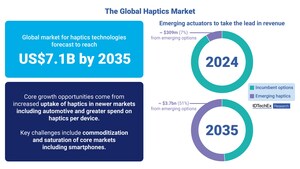Biobased Polymers Will Grow Twice as Fast as Petrochemical Polymers, Finds IDTechEx Research
BOSTON, Jan. 29, 2019 /PRNewswire/ -- Biobased polymers are a class of polymers that are manufactured from a biomass source, rather than from an oleochemical source. Although some of these types of polymers have been well known for over a century, they have not yet seen widespread application due to barriers facing production, such as cost and scale. However, thanks to innovations in synthetic biology, these polymers are becoming more affordable to manufacture, and therefore more commonly encountered. Increasing customer awareness of the climate impact of petrochemically derived polymers, as well as a global shift in demand away from plastics with a lifespan of several hundreds of years, has resulted in renewed focus on this previously inaccessible area. Biobased polymers can come in multiple different forms: direct, or "drop-in" replacements for their petrochemical counterparts offering near-identical properties, or entirely novel polymers that were previously inaccessible, such as polylactide, some of which offer substantially improved technical specifications compared to their alternatives. The technology and market trends that are driving the growth in production of biobased polymers are discussed in the recent report from IDTechEx Research: Biobased Polymers 2018-2023: A Technology and Market Perspective.
New biobased polymers with novel properties
Harnessing genetically engineered organisms to produce biobased polymers is a key growth area accessible thanks to advances in synthetic biology. New monomers may be produced by engineered microorganisms such as yeast or bacteria from a renewable feedstock, which is a particularly appealing method for increasing the green credentials of a product and reduce associated CO2 emissions. The foremost biobased polymer that is biomanufactured is PLA, and demand has been growing steadily since the early 2010s. However, biobased monomers are not the only route into the biomanufacturing of polymers: PHAs are a class of entirely biomanufactured biobased polymers, which are produced internally within engineered microorganisms. Despite this, market growth for biobased polymers have faced considerable headwinds including high costs of production and competition from the low price of oil. These key market growth drivers and restraints are discussed in depth in the report.
Biobased Polymers 2018-2023: A Technology and Market Perspective
In 2018, the range of biobased polymers was hugely varied, yet disparate. Biobased Polymers 2018-2023: A Technology and Market Perspective takes an in-depth look into the diverse range of biobased polymers, from established to nascent, providing detailed case studies of leading-edge companies developing the technology, while pulling together related polymer classes. An overview of the latest tools utilized in the field of synthetic biology is provided, with a focus on CRISPR, protein and organism engineering and commercial scale fermentation. Furthermore, this report cuts through the marketing hype to offer a detailed insight into some of the foremost biobased polymer companies leading global innovation and bringing potentially disruptive products to market.
For more information contact the IDTechEx Research team at [email protected] or visit www.IDTechEx.com/biopoly.
Media Contact
Charlotte Martin
Marketing & Research Co-ordinator
[email protected]
+44(0)1223 812300
Related Links
SOURCE IDTechEx
WANT YOUR COMPANY'S NEWS FEATURED ON PRNEWSWIRE.COM?
Newsrooms &
Influencers
Digital Media
Outlets
Journalists
Opted In






Share this article